新概念第一册Lesson71-72
新概念英语第一册lesson71-72教材
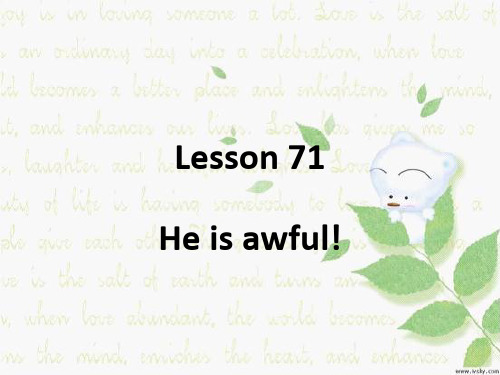
I made a big mistake.
5. I’m sorry I’m late.
I’m sorry for being late.
* be sorry for sth/doing sth 对某事感觉很抱歉
我对我犯的错误感觉很抱歉。
日常用语——受到批评
(一)常用句型——表示批评 1. You have gone too far.
你太过分了。 It’s going a bit too far. It’s really annoying. * annoying 令人烦恼的,令人恼火的
2. I keep telling her not to do it, but it just goes in through one ear and out the other.
③ n. 答案;解决办法;答复 • 我给他写了好几封信,可都没有回音。
I wrote him several letters but couldn't get an answer. • 你知道第十题的答案吗?
Do you know the answer to Question 10?
• This is one of the possible answers to today's environmental problems. 这是有可能解决当今环境问题的办法之 一。
She pretended herself as her mother.
ቤተ መጻሕፍቲ ባይዱ习
• Why Pauline thinks that Ron is awlful? • How many times did Ron telephone
新概念课堂笔记 第一册 Lesson 71-72
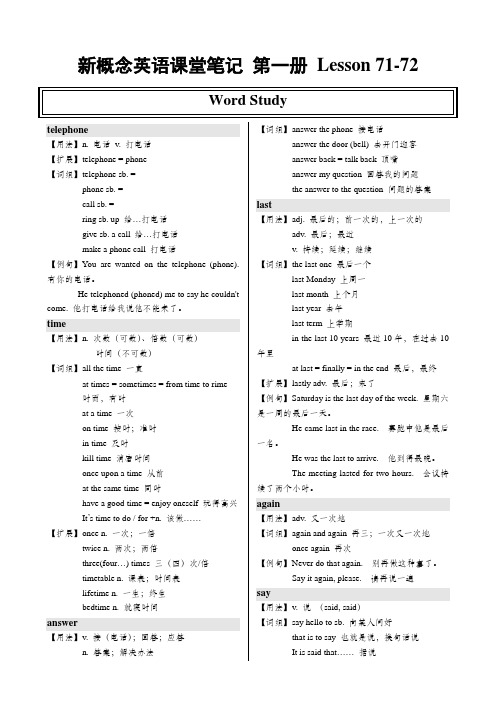
新概念英语课堂笔记第一册Lesson 71-72telephone【用法】n. 电话v. 打电话【扩展】telephone = phone【词组】telephone sb. =phone sb. =call sb. =ring sb. up 给…打电话give sb. a call 给…打电话make a phone call 打电话【例句】You are wanted on the telephone (phone). 有你的电话。
He telephoned (phoned) me to say he couldn't come. 他打电话给我说他不能来了。
time【用法】n. 次数(可数)、倍数(可数)时间(不可数)【词组】all the time 一直at times = sometimes = from time to rime时而,有时at a time 一次on time 按时;准时in time 及时kill time 消磨时间once upon a time 从前at the same time 同时have a good time = enjoy oneself 玩得高兴It’s time to do / for +n. 该做……【扩展】once n. 一次;一倍twice n. 两次;两倍three(four…) times 三(四)次/倍timetable n. 课表;时间表lifetime n. 一生;终生bedtime n. 就寝时间answer【用法】v. 接(电话);回答;应答n. 答案;解决办法【词组】answer the phone 接电话answer the door (bell) 去开门迎客answer back = talk back 顶嘴answer my question 回答我的问题the answer to the question 问题的答案last【用法】adj. 最后的;前一次的,上一次的adv. 最后;最近v. 持续;延续;继续【词组】the last one 最后一个last Monday 上周一last month 上个月last year 去年last term 上学期in the last 10 years 最近10年,在过去10年里at last = finally = in the end 最后,最终【扩展】lastly adv. 最后;末了【例句】Saturday is the last day of the week. 星期六是一周的最后一天。
新概念英语第一册课件 NCE1 Lesson 71-72
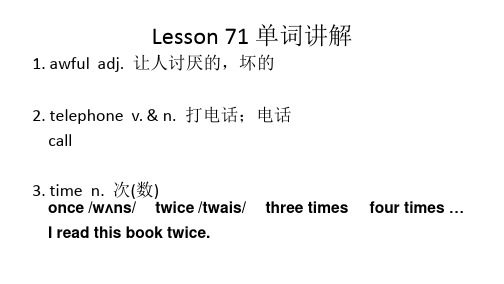
Lesson 71 单词讲解1.awful adj. 让人讨厌的,坏的2.telephone v. & n. 打电话;电话call3.time n. 次(数)once /wʌns/ twice /twais/ three times four times …I read this book twice.4.a nswer v. 接(电话)answer the phonest adj. 最后的,前一次的last night / last week / last month / last year6.phone n. 电话7.again adv. 又一次地Very nice to see you again.8.say (said) v. 说say /sei/ said /sed/ says /sez/say VS speaksay 强调说话的内容She said hello to me.He said sorry to me.My mom always says “Life was like a box of chocolate…”speak 突出说话的方式或动作本身speak loudly speak slowly speak EnglishLesson 71 课文讲解What is the climate like?What is the weather like?He telephoned me again.yesterday evening last nightLesson 71 语法讲解He was in the office.Was he in the office?Yes, he was. No, he wasn’t.He wasn’t in the office.Where was he?Who was in the office?There was a car race in our town in 1998. Was there a car race in our town in 1998? There wasn’t a car race in our town in 1998. What was there in our town in 1998?He went to school yesterday. do did /did/ Did wentDo he go he Do to school yesterday? ? e He like s coffee .He went to school yesterday. do notdid He donotgowent to school yesterday.He didn’t go to school yesterday.He went to school y e s t e r d a y. 他什么时候去上学了?did When do hegowent to school?He went to s c h o o l yesterday. 他昨天去哪了?did goWhere do he went yesterday?He w e n t to school yesterday. 他昨天干什么了?did doWhat do he did yesterday?He went to school yesterday. 昨天谁去上学了?Who went to school y esterday?She lived in New York.Did she live in New York? Yes, she did. No, she didn’t. She didn’t live in New York. Where did she live?Who lived in New York?I bought a book in that bookstore last week. bought /b ɔ : t/ buy 的过去式Did you buy a book in that bookstore last week? Yes, I did. No, I didn’t.I didn’t buy a book in that bookstore last week.When did you buy a book in that bookstore?Where did you buy a book last week?Lesson 72 单词句型讲解Today:this morningthis afternoonthis eveningLesson 72 单词句型讲解t onightLesson 72 单词句型讲解Yesterday:yesterday morningyesterday afternoonyesterday eveningLesson 72 单词句型讲解l ast nightThe day before yesterday:the day before yesterday in the morningthe day before yesterday in the afternoonthe day before yesterday in the evening如遇到视频无法正常播放,课件错误,知识点错t 误h 等e 课n 程问ig 题h ,t 可b 以e 添f 加o 服r 务e Ql Qa 3s 17t 0322794进行解决,学习问题请到知识堂: http:/Tomorrow:tomorrow morningtomorrow afternoontomorrow eveningtomorrow nightThe day after tomorrow:the day after tomorrow in the morningthe day after tomorrow in the afternoonthe day after tomorrow in the eveningthe night after next1.She is going to come now. (when)2.She can come now. (when)3.She wants a new bike. (what)4.There is a book on the table. (what)5.They like black coffee. (what)6.Mary comes from Germany. (where)7.He must go home now. (when)8.She feels ill. (how)9.He has a cold. (what)10.She cleaned her shoes. (when) A 一般疑问句B 特殊疑问句C 否定句1.She is going to come now. (when)Is she going to come now?When is she going to come?She isn’t going to come now.2.She can come now. (when)Can she come now?When can she come?She can’t come now.3.She wants a new bike. (what)Does she want a new bike?What does she want?She doesn’t want a new bike.• 4. There is a book on the table. (what)•Is there a book on the table?•What is there on the table?•There isn’t a book on the table.5.They like black coffee. (what) •Do they like black coffee?•What do they like?•They don’t like black coffee.6.Mary comes from Germany. (where) •Does Mary come from Germany?•Where does Mary come from?•Mary doesn’t come from Germany.7.He must go home now. (when) •Must he go home now?•When must he go home?•He needn’t / mustn’t go home now.8.She feels ill. (how) •Does she feel ill?•How does she feel?•She doesn’t feel ill.9.He has a cold. (what)•Does he have a cold?•What does he have?•What is the matter with him?•He doesn’t have a cold.10.She cleaned her shoes. (when) •Did she clean her shoes?•When did she clean her shoes?•She didn’t clean her shoes.。
新概念英语一NCE1_lesson71-72(共30页)

say speak talk tell的辨析
say /sei/ (said/sed/) v. 说 强调说的内容 I said to him, 'Don't be late next time.' 我对他说:“下次别迟到了。”
Lesson 71-72
5 Ask me how many times Ron Marston telephoned Pauline yesterday and the day before yesterday. How many times did Ron Marston telephone Pauline yesterday and the day before yesterday? 6 Ask me when Ron Marston telephoned the office. When did Ron Marston telephone the office? 7 Ask me who answered the telephone. Who answered the telephone?
精讲课文
6.This is Pauline's mother. 我是波琳的母亲。
This is…是英美人打电话时表示“我是……” 的句式,而不说 I'm…。相关的电话用语如: This is Mary speaking. 我是玛丽。 This is Edward calling from London. 我是爱 德华,现正在伦敦给你打电话。
用介词at, on和in的时间短语 【in】是“大姐”,因为后面所接的都是较长时间(月、年、 季节等)。 【on】是 “二姐”,后面所接的时间多与日期有关(星期、 日期、具体时间、纪念日等)。 【at】是“小妹”,因为接在后面的时间最短(具体时刻或某 短暂时间)。
新概念英语第一册Lesson 71-72
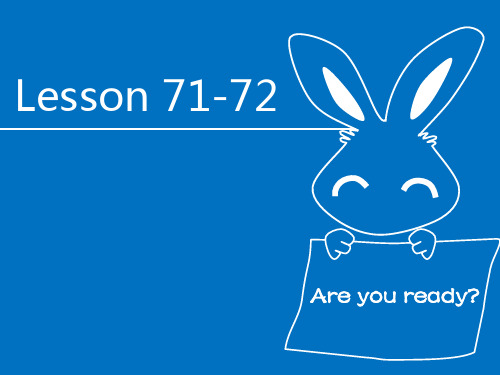
Grammar
一般过去时 要跟表示过去的时间状语连用
今天 today 昨天 yesterday 前天 the day before yesterday
When did you do…?
小试牛刀
What did she/he/they do? they/ clean their shoes/ yesterday he/ open the box/ last night they/ sharpen their pencils/ this evening she/ listen to the radio/ last night they/ play a game/ yesterday afternoon
总结
一般过去式 以实义动词引导的一般过去时 动词的过去式变化规则 表示过去时间的时间状语 句型变化 变否定句 变一般疑问句
See you!
判断下列句子是否正确,正确的写“T”,错误的写“F”, 并改正 01.His mother clean the room every morning. 02.They go to the school on foot every day. 03.He usually reads newspaper after lunch. 04.They don’t doing their homework now. 05.Mr.Black goes to work by a car every day. 06.She and her friend often drinks tea together. 07.I want a envelope,please. 08.I not have any writing papers. 09.What else do you want? 10.The boy playing in the garden.
新概念英语NCE1_lesson71-72(共24页)课件

He telephoned at nine o'clock. Jane: What did you say to him? PAULINE: I said, 'This is Pauline's mother. Please don't telephone my daughter again!' Jane: Did he telephone again? PAULINE: No, he didn't!
PAULINE: He telephoned the office yesterday morning and yesterday afternoon. My boss answered the telephone. JANE: What did your boss say to him? PAULINE: He said, "Pauline is typing letters. She can't
He boiled some yesterday. 4. We are enjoying our lunch.
We enjoyed it yesterday, too.
she/air the room/ yesterday What did she do yesterday? She aired the room yesterday.
3. I’m watching my time. of the time 当时 make time 腾出时间 4.Time will tell. 时间会证明一切。 5.Time and tide wait for no man. 岁月不等人。 6.Time heals all wounds. 时间会治愈所有的创伤。
新概念英语第一册71-72课

May I speak to Pauline, please? I’d like to speak to Pauline, please. 在电话中回答:This is….
课堂小练习:
1、Anna, dinner is ready. Where's Peter? He ( )his homework in his room. A does B did C is doing D will do 2、( ) are the two girls doing in the calssroom. A Who B What C Where D When 3、Lucy is talking( )Tom ( )the sports meeting. A to; about B about; to C with; to D to; with 4、Who is Nancy( )?
改为选择疑问句) 1. What is the man doing in the factory? 2. Here are photos of my family.
3. She likes buying something on Sundays. 4. Are the boys playing volleyball or(playing)basketball?
yesterday evening. He telephoned again. But I didn't answer the phone!
JANE:
Did he telephone again last night?
PAULINE: Yes, he did.
He telephoned at nine o'clock.
新概念第一册Lesson 71-72
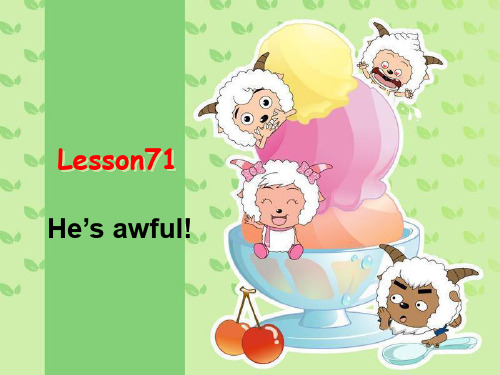
一般过去时(I)
语 法 回 顾 (一 )
含有be动词的过去时
1、概念:过去时间存在的状态。
2、结构:主语+was/were+其他
否定句:主语+ wasn’t/ weren’t +其他 He wasn’t a good boy. 一般疑问句:Was/ Were+ 主语+ 其他? 肯定回答:Yes, 主语+ was/ were. 否定回答: No, 主语+ wasn’t/weren’t .
3.) 一般疑问句:
Did +主语+动词原形+其它? 肯定回答:yes, 主语+did. 否定回答:No,主语+didn’t. ---Did he telephone you four times yesterday? ---Yes, he did . / No, he didn ’t.
4.) 特殊疑问句:特殊疑问词+ did +主语+动 词原形+其它? ---What did he do yesterday? He telephoned me four times yesterday.
6. I listened to a song yesterday evening. I didn’t listen to a song yesterday evening. Did you listen to a song yesterday evening? Yes, I did. No, I didn’t.
5. She worked in a factory three years ago. She didn’t work in a factory three years ago. Did she work in a factory three years ago? Yes, she did. No, she didn’t.
新概念英语第一册Lesson71-72笔记(语法点+配套练习+答案)
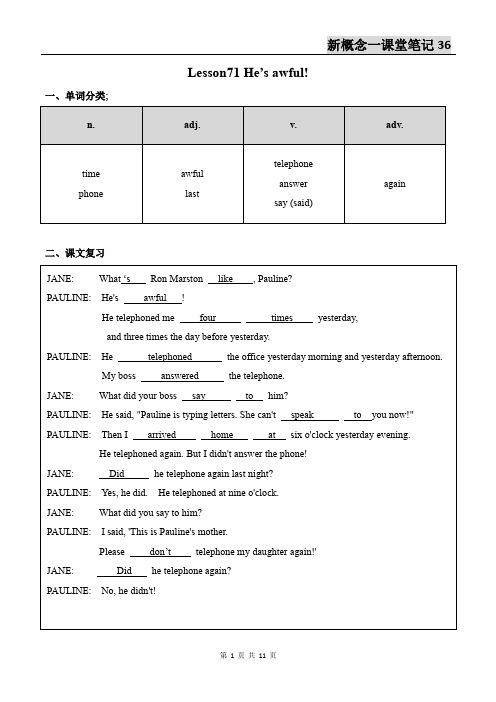
9.Where did you go yesterday?
10.Helen arrived home late last night.
3.动词过去式的变化规则
1直接加ed
2哑音e结尾,加d
3辅元辅,闭音节,双写词尾辅音加ed
4辅音+y结尾,变y为i加ed
练习一:变过去式
again adv.再,又
Please say it again.请再说一遍。
See you again.下次再见。
What's ... like ?...怎么样?
=How is ... ?
What’s your new teacher like? ( B )
A.He is happy.
B.He is tall and kind.
4.Our teacher went to the hospital yesterday.
5.They are going to the restaurant together.
6.Mr.Black often ran around the park last year.
7.There was a book on the floor just now.
Rememberto telephonethe doctor when you fee ill.
生病的时候记得给医生打电话。
Can I use your mobile phone please?
I wantto make a telephone call.
我可以用你的手机吗?我想打一个电话。
time n.
今夜
tonight
新概念第一册lesson71-72
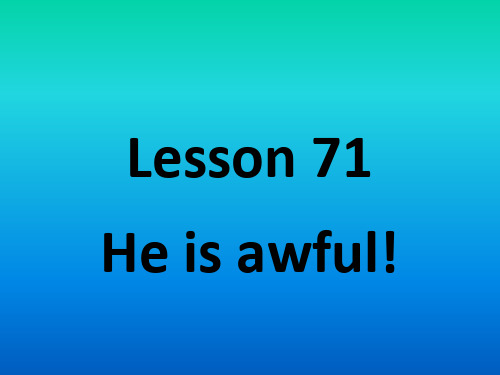
2、用介词in的时间短语: 一天中的某段时间(in the evening) 月份(in March) 年份(in 1997) 季节(in spring) 世纪(in the 20th century) 节日(in Easter week【时间长的】) 时期(in the holidays)
(at 在小地点)
New words and
expressions
• awful • telephone • time • answer • last • phone • again • say (said)
adj. 让人讨厌的,坏的 v. & n. 打电话;电话 n. 次(数)
v. 接(电话) adj. 最后的,前一次的 n. 电话(=telephone) adv. 又一次地 v. 说
Lesson 71 He is awful!
Review
用介词at和in的时间短语
1、用介词at的时间短语通常表示: 确切的时间(at 10 o’clock) 用餐时间(at lunchtime) 其他时刻(at noon/night) 节日(at Spring Festival【没有day的】) 年龄(at the age of 27)
有回音。
• I wrote him several letters but couldn’t get an answer.
你知道第十题的答案吗? Do you know the answer to Question 10 ?
last adj. 前一次的 最后的
• Last + 时间, 表示过去 上个星期 上个月 去年
He telephoned again. But I didn't answer the phone!
新概念1 Lesson71-72

拓展:
Key words:
★ time n. 次(数) time在英语中作不可数名词时,表示 “时间”; 作可数名词时表示“次数”,三次或 三次以上通常用基数词+times表示: once, twice, three times
Key words:
time常用短语:
on time 按时,准时 in time 及时 all the time 一直
• 杰克灯 • 杰克灯是万圣节最广为人 知的象征物。在英国和爱 尔兰,当地人原本在挖空 的芜菁中燃点蜡烛造成杰 克灯,但移民到美国的人 很快便采用南瓜代替,因 为南瓜比较大和容易在上 面雕刻图案。不少家庭在 南瓜上刻上吓人的面容, 并放在大门口的阶梯上, 传统上此做法是想吓走恶 魔或妖怪。
• 咬苹果 • 万圣节前夜最流行的游 戏是“咬苹果游戏” • (Bobbing for Apples) 游戏时,人们让苹果漂 浮在装满水的盆里,然 后让参与者在不用手的 条件下用嘴去咬苹果, 谁先咬到,谁就是优胜 者。
★ answer [ˈɑ:nsə] v. 接(电话)
① v. 对……作出反应;响应 answer the phone/telephone 接电话 answer the door/doorbell 应声开门 玛丽拖了几分钟时间才去开门。 It takes Mary a few minutes to answer the door.
新概念第一册lesson71-72完整版
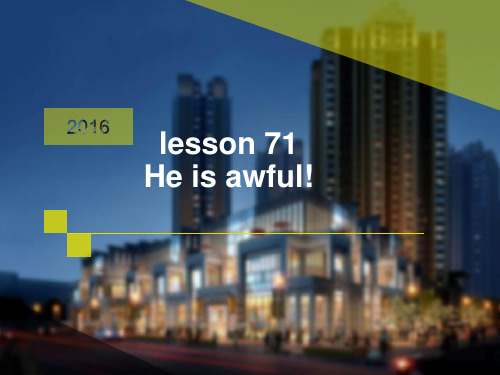
• 3.) 一般疑问句及其回答: • did +主语+动词原形+其它?句末用问号。 • 肯定回答:yes, …did. • 否定回答:No, …didn’t. • 如:did he telephone you four times yesterday? yes, he did . / no, he didn’t. • 4.) 特殊疑问句:特殊疑问词+ did +主语+动 • 词原形+其它?句末用问号。 • 如:Then did he telephone you four times? • He telephoned me four times yesterday?
C
in three hours
D
three hours before
LOREM IPSUM DOLOR
• • • • • • • • • • • • • • • The twins__in Dalian last year. they___here now. a.are,were b.were,are c.was,are d.were,was I cleaned my classroom ___________. A with three hours B three hours ago
• speak to sb. 与某人说话 我能和Jack说话吗? May I speak to Pauline, please? =I’d like to speak to Pauline, please. • 在电话中回答:This is…. • pretend as 假装 She pretended herself as her mother.
LOREM IPSUM DOLOR
新概念第一册Lesson71-72教材

telephone /'telɪfəʊn/ v. & n. 打电话;电话
time /taɪm/
n. 次(数)
answer /'ɑːnsə/
v. 接(电话)
last /lɑːst/
adj. 最后的,前一次的
phone /fəʊn/ n. 电话(=telephone)
again /ə'gen/
adv. 又一次地
He telephoned again. But I didn't answer the phone!
JANE: Did he telephone again last night?
PAULINE: Yes, he did. He telephoned at nine o'clock. JANE: What did you say to him?
JANE: What did your boss say to him?
PAULINE: He said, "Pauline is typing letters. She can't speak to you now!"
PAULINE: Then I arrived home at six o'clock yesterday evening.
PAULINE: He's awful! He telephoned me four times yesterday, and three times the day before yesterday.
PAULINE: He telephoned the office yesterday morning and yesterday afternoon. My boss answered the telephone.
新概念英语第一册-Lesson71-72

telephone n.电话 ,电话机
我的爸爸昨天买了一个新的电话机。 My father bought a new telephone yesterday.
我想不起他的电话号码了。 I can’t remember his telephone number.
answer the telephone 听电话
■基数词+times(复数) 几次(两次以上)
三次 四次 … 一次 两次
three times four times
once twice
■序数词+time(单数) 第…次 第一次 the first time 第二次 the second time …
answer v. 接(电话)
接电话 answer the telephone 我的老板接的电话 My boss answered the telephone.
时间状语:有now时 ,以look, listen开头时,表示当前一段时间或现阶段正在 进行的动作,且此时有this week, these days等时间状语时 。
3.She can’t speak to you now. speak to sb. 与某人说话
1
4.Then I arrived home.
2. Pauline is typing letters.
现在进行时由“be+v-ing”构成。
肯定句式:主语+be( am, is, are)+现在分词+其它. 否定句式:主语+be(am, is, are) +not +现在分词+其它. 一般疑问句:Be(am, is, are) +主语+现在分词+其它? 特殊疑问句:疑问词+be(am, is, are)+主语+现在分词+其它?
新概念英语第一册Lesson 71-72综述

JANE :
What did you say to him ? Please don’t telephone my daughter again ! ’
PAULINE : I said , ‘This s Pauline’s mother .
JANE :
Did he telephone again ?
He telephoned again . But I didn’t answer the phone !
JANE :
Did he telephone again last night ?
PAULINE : Yes , he did . He telephoned at nine o’ clock .
Key words:
★awful
adj. 让人讨厌的,坏的
★time n. 次(数) time 作不可数名词时表示“时间”; eg. What time is it ? 作可数名词时表示“次数”, 三次或三次以上通常用基数词+times表示. once,twice,three times .
★answer v. 接(电话) ① v. 对……作出反应;响应 answer the phone/telephone 接电话 answer the door/doorbell 应声开门 My boss answered the telephone . 我的老板接了电话。 ② v. 回答;答复 answer the question 回答问题 Please answer my question. 请问答我的问题。 ③ n. 答案;解决办法;答复 Do you know the answer to Question 10 ? 你知道问题10的答案吗 ?
- 1、下载文档前请自行甄别文档内容的完整性,平台不提供额外的编辑、内容补充、找答案等附加服务。
- 2、"仅部分预览"的文档,不可在线预览部分如存在完整性等问题,可反馈申请退款(可完整预览的文档不适用该条件!)。
- 3、如文档侵犯您的权益,请联系客服反馈,我们会尽快为您处理(人工客服工作时间:9:00-18:30)。
Lesson 71 He’s awful! What’s Ron Marston like, Pauline?
What is … like? 。。。怎么样? What’s the weather like? 天气怎么样? What’s Tom like? Tom人怎么样?
He’s awful.
be awful 让人讨厌的,厌恶的 = make sb. sick Gegewu is awful. Gegewu makes me sick.
say
v. 说
• 过去式 said • say to sb. 对某人说…
Notes on the text 课文注释
Listen and answer the questions
How did Pauline answer the telephone at nine o’clock?
She said, ‘This is Pauline’s mother. Please don’t telephone my daughter again!’
JANE: Did he telephone again last night?
PAULINE: Yes, he did. He telephoned at nine o'clock.
JANE: What did you say to him?
PAULINE: I said, 'This is Pauline's mother. Please don't telephone my daughter again!‘ JANE: Did he telephone again? PAULINE: No, he didn't!
JANE: What's Ron Marston like, Pauline?
PAULINE: He's awful! He telephoned me four times yesterday, and three times the day before yesterday.
PAULINE: He telephoned the office yesterday morning and yesterday afternoon. My boss answered the telephone.
语法课堂 教学目标一:一般过去时(II)
表示过去某一时间发生的动作 知道行为动词一般过去时的构成 知道一般过去过的几种基本句型
行为动词变一般过去时的构成
1.一般在动词后直接加-ed answer-answered wait---waited 2.以不发音的e结尾的动词直接加-d telephone---telephoned arrive--arrived 3.以辅音加y结尾的,把y改为i,再加ed empty—emptied 4.辅元辅结构,双写最后一个辅音字母,再加-ed stop-stopped 5.不规则动词have-had , forget-forgot say-said, go-went, run-ran
He telephoned the office yesterday morning and yesterday afternoon. telephone sb / sth 给……打电话 时间状语 yesterday morning 昨天早上 yesterday afternoon 昨天下午 yesterday evening 昨天晚上
He telephoned me four times yesterday, three times the day before yesterday. 一般过去时 telephone的过去式:telephoned time 时间;次数 once 一次 twice 两次 three times 三次 four times 四次
answer
v. 接(电话)
① v. 对……作出反应;响应
• answer the phone/telephone 接电话 • answer the door/doorbell 应声开门
② v. 回答;答复
answer a letter 回信 Please answer the questions. 请回答问题。
过去式变一般疑问句时用did做助动词。 肯定回答:Yes, … did. 否定回答:No, … didn’t.
He telephoned me … I said … Did he ….? My boss answered … 一般过去时 表示过去发生的动作 主语+be/动词的过去式+其他
Grammar 一般过去时(I)
JANE: What did your boss say to him? PAULINE: He said, "Pauline is typing letters. She can't speak to you now!"
PAULINE: Then I arrived home at six o'clock yesterday evening. He telephoned again. But I didn't answer the phone!
注 意 做 笔 记 哦!
一般过去时的练习
air-aired ,clean―cleaned, open― opened sharpen―sharpened, turn on―turned on listen― listened, boil― boiled, arrive― arrived play― played,stay― stayed,shave― shaved, climb― climbed, call― called, telephone― telephoned, empty― emptied
My boss answered the telephone.
answer the telephone 接电话 answer的过去式 answered
What did your boss say to him?
say to sb. 给某人说…… do的过去式:did
He said, “Pauline is typing letters. She can’t speak to you. ” say的过去式:said type letters 打字 speak to sb. 跟……讲话 tell 告诉 say 说 talk 谈话
He telephoned me four times yesterday, three times the day before yesterday. the day before yesterday 前天 时间状语 今天 today 昨天 yesterday 前天 the day before yesterday
本课重点语法
一般过去过的几种基本句型 3.) 一般疑问句及其回答:
Did +主语+动词原形+其它?句末用问号。 肯定回答:yes, …did. 否定回答:No, …didn’t. 如:Did he telephone you four times yesterday? Yes, he did . / No, he didn ’t. +主语+动 4.) 特殊疑问句:特殊疑问词 + did
time
n. 次(数)
• time在英语中作不可数名词时表示“时 间”;作可数名词时表示“次数”, 三次或三次以上通常用基数词+times表示: • 一次 once, • 两次 twice, • 三次 three times • 七次 seven times
on time 按时,准时 in time 及时 all the time 一直 once upon a time 很久很久以前
again 再次,又一次 but 表示转折 telephone的缩写:phone
Did he telephone again last night? Yes, he did.
did是do的过去式,过去式变一般疑问 句时用did做助动词。 last last last last night 昨晚,前一晚 week 上周 month 上月 year 去年
概念:表示过去某一时间发生的
动作或存在的状态,通常以动词
的过去式表示,其否定句和各种 疑问句靠助动词did构成。
一般过去时(I)
构成1:(过去时间存在的状态) be 的过去式是was 和were, was 用于第一人称和第三人称单数, were用于其他人称, 如:We were there at four o’clock.(P140) Were you at the butcher’s.(P133) I was at home on Saturday.(P136)
/'ɔːfəl/
/sed/
/lɑːst/
/'telɪfəʊn/
/'ɑːnsə/
/seɪ/ /ə'gen /
/taɪm/
last time
awful again
telephone
said
answer
say phone
awful
常 • (在表示负面的情景中,可用 awfully代替very) I am awfully (very) sorry.
Then I arrived home at six o’clock yesterday evening.
arrive的过去式:arrived arrive at+小地点 arrive in+大地点 具体几点几分前用介词at
He telephoned again. But I didn’t answer the phone!
He telephoned at nine o’clock. What did you say to him? I said, ‘This is Pauline’s mother. Please don’t telephone my daughter again. ’
